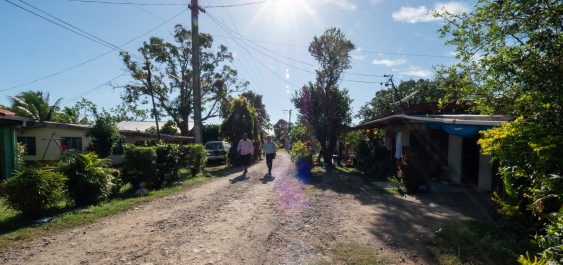A visit to Namotomoto shows the power of small data

After her presentation at the Capacity Building in Green Infrastructure and Housing for Poverty Reduction symposium in Nadi, Fiji, Dr Simone Zarpelon Leao uncovered some significant small data being collected at the village level.
The symposium in Fiji brought together government and NGO representatives, academics, students and community members from all over the Pacific region and Australia to collaborate and learn from each other to build capacity in developing sustainable infrastructure and housing maintenance to improve the quality of life of local communities.
It was the first phase of a UNSW Institute for Global Development (IGD) project led by Dr Sarath Mataraarachchi, Senior Lecturer in the Faculty of Built Environment.
Dr Leao is a Research Fellow in Urban Modelling and Simulation in the City Futures Research Centre whose work focuses on smart cities and big data – making the most of data to assist decision-making and evidence-based planning to improve the quality of life in cities.
“My presentation at the symposium was related to the importance of data for planning, as well as the infrastructure necessary to enable this data to flow from where it is produced to become information that can lead to good decision making.
“Very often people say a lack of data impedes good decision making. In my experience, sometimes the data exists, but it is so fragmented this data can’t find its way through the network.
“Data needs an infrastructure where it can be cleaned and integrated before it can be used by communities, government departments and the many stakeholders. Also, if we really want effective access to data so that it can make a difference, we need to build in privacy, security and ownership.”
Dr Leao uses the analogy of water infrastructure in cities: firstly, you need treatment plants to get the water to the right quality, you need an effective pipe system to take the water to the buildings, and then you need the taps at the end which give you the water.
While Dr Leao’s focus is usually on big data, in a Fijian village she saw the value of small data.
“In Namotomoto village, which we visited during the symposium, I discovered that it has about 700 inhabitants and has had its own annual digital census, collecting demographics, employment and other information, for the past eight years. The information is detailed, about health issues such as when people get sick and those who have disabilities, as well as children who are attending school.
“It is more comprehensive than the official national census – in the Pacific Islands, the censuses are very intermittent and inconsistent.”
Dr Leao says the symposium presentations, workshops and site visits were a fantastic opportunity to look at sustainable infrastructure in a situation with limited economic resources and a high demand for infrastructure, as well as high vulnerability to natural disasters and climate change.
“It was also an interesting mix of expertise in sectors – representatives from community and government, NGOs and universities, so there was a cross-pollination of views and experience about the issue of infrastructure planning.”
Belinda Henwood is a digital copywriter and editor who moves easily across audiences and formats. She has strong stakeholder management skills and is a plain English advocate who specialises in making complex ideas intelligible for the reader.














